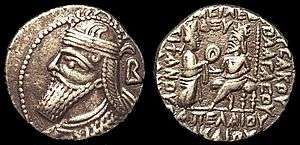Vologeso

Il Vologeso is the title of several operas, based on the same story as Apostolo Zeno's Lucio Vero, but in a later version (1700), which had first been set to music as Vologeso, re de' Parti by Rinaldo di Capua in 1739 to a libretto by Guido Eustachio Luccarelli.
The best-known version, and the only one to be revived and recorded in the modern era, is Il Vologeso (1766), an opera by Niccolò Jommelli. The same libretto was also set by many other composers, including Antonio Sacchini and Davide Perez.[1][2] It was set at least fifteen times under the title Lucio Vero and at least five under the title Il Vologeso. It was also set by Ariosti under the title Lucio Vero, imperator di Roma (1727), by Reinhard Keiser under the title Lucius Verus (1728) and by Davide Perez under the title Berenice (1762). Following contemporary tastes, the librettos were altered in the course of the century to shorten recitatives and simplify the plot.[3]
Plot
The plot concerns king Vologeso (based on Vologases IV of Parthia, 148–191) who is deposed by Lucio Vero (loosely based on Lucius Verus, 130–169) and restored by another Roman, Flavio (created for the story by Zeno).[4][5][6]
References
- ↑ Annals of opera, 1597-1940 Alfred Loewenberg - 1970 Jommelli: II Vologeso 11 February. Ludwigsburg Text: a later version of Zeno's Lucio Vero (1700), first set to music by Rinaldo di Capua in 1739. Three acts. Lisbon Carnival 1769. A scene from this opera was sung at a London concert as ..."
- ↑ Anecdotes of music, historical and biographical Volume 3 Page 288 Allatson Burgh 1814 The operas by which he [Davide Perez] acquired the greatest fame in Portugal were, Demetrio and Solimano, which, as they were to be alternately performed with the dramas of Vologeso and Enea in Latio, composed by Jomelli, at the request of his most "
- ↑ Marita P. McClymonds. "Lucio Vero". In L. Root, Deane. Grove Music Online. Oxford Music Online. Oxford University Press. (subscription required)
- ↑ http://www.classical.net/music/recs/reviews/o/orf20983a.php
- ↑ The Middle East under Rome - Page 146 Maurice Sartre - 2005 "Benefiting from the change in sovereigns in Rome, Vologases IV installed a Parthian prince, Pacoros, in Armenia. ... Lucius Verus, ordered to lead the expedition against the Parthians, chose to assemble his troops in Antioch, "
- ↑ The Mediterranean world in ancient times Eva Matthews Sanford - 1951 A few years later Vologases III of Parthia (148–191) renewed hostilities by setting up his own protege on the throne of Armenia. Lucius Verus duplicated Trajan's campaign in 163–164, reestablished the Roman protectorate in Armenia, ...